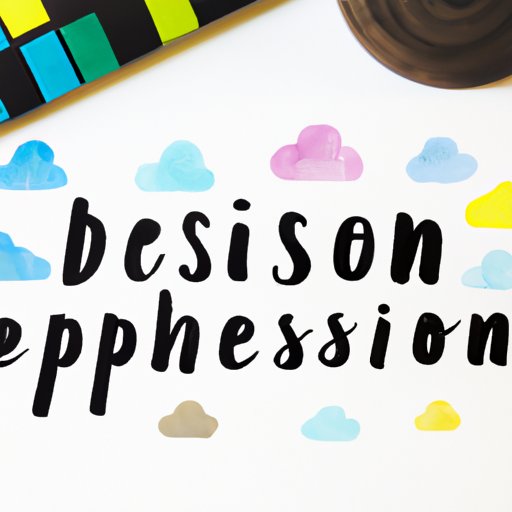
I. Introduction
Depression is a common mental illness that affects millions of people around the world. It is a serious condition that can negatively impact a person’s physical and emotional well-being, as well as their relationships and ability to work. Supporting someone with depression can be difficult, but it’s important to remember that the right support can make a big difference in their recovery. In this article, we will discuss how to support someone with depression and offer tips and strategies for helping them through their journey to recovery.
II. Share Personal Experiences
Sharing personal experiences is an important way to support someone with depression. It helps to normalize the condition and shows the person that they are not alone. If you have experience supporting someone with depression, consider sharing your story with them. This can help them feel less isolated and may offer insight into what they are going through.
Personally, I have supported a family member through severe depression. I learned that supporting someone with depression means listening without judgment and offering help when needed. It also means understanding that there are ups and downs in the journey to recovery, but that with the right support, a person can get better.
III. Focus on Communication
Open and honest communication is key when supporting someone with depression. It’s important to be patient, attentive, and understanding. Active listening is also a critical part of effective communication. This means allowing the person to talk openly about their feelings and thoughts without interruption or judgment. When approaching sensitive topics with someone dealing with depression, it’s important to do so with kindness and understanding.
One strategy for effective communication is to use “I” statements. This means speaking from your own perspective, instead of making assumptions or judgments about the other person. For example, instead of saying “Why can’t you just snap out of it?” you could say: “I understand that you’re going through a tough time, and I want to help you get support.” You can also encourage them to seek professional help through therapy or mental health services.
IV. Provide Resources
It’s important to provide resources and support for someone with depression. This may include a list of helpful resources such as hotlines, support groups, and therapy options. You can also encourage the person to make an appointment with their doctor or mental health professional to discuss their treatment options. Below are some helpful resources that can be used to support someone with depression:
- The National Suicide Prevention Lifeline – 1-800-273-TALK (8255)
- The American Psychological Association’s Psychologist Locator – a directory of licensed psychologists across the US
- The Anxiety and Depression Association of America (ADAA) – a nonprofit organization that offers information on anxiety and depression, as well as treatment options and resources
- The Depression and Bipolar Support Alliance – a national organization that provides resources and support for people with depression and bipolar disorder
V. Emphasize the Importance of Self-Care
Depression can affect a person’s ability to care for themselves, making self-care an important part of supporting someone with this condition. Encourage the person to prioritize their self-care needs, such as getting rest, eating well, and engaging in activities they enjoy. You can also offer to help them with daily tasks such as cooking, grocery shopping, or cleaning. It’s also important for the caregiver to practice self-care, so they don’t burn out and can continue to offer support.
VI. Advocate for Professional Help
While support from friends and family can be helpful, seeking professional help is often the most effective way to treat depression. Encourage the person to talk to their doctor or mental health professional about their treatment options. A licensed therapist or psychiatrist can provide an accurate diagnosis, offer therapy or medication, and create a comprehensive treatment plan tailored to their specific needs.
When looking for a quality therapist, it’s important to do some research. You can ask for recommendations from friends or family, or search online for licensed mental health professionals in your area. Look for someone who is experienced in treating depression and has a compassionate and non-judgmental approach to therapy.
VII. Conclusion
In conclusion, supporting someone with depression is about being patient, understanding, and offering help in a non-judgmental way. Effective communication, resources, self-care, and seeking professional help are all essential parts of supporting someone through depression. Remember that the journey to recovery can be challenging, but with the right support, there is hope for healing and a brighter future.
If you or someone you love is struggling with depression, don’t hesitate to seek help.




